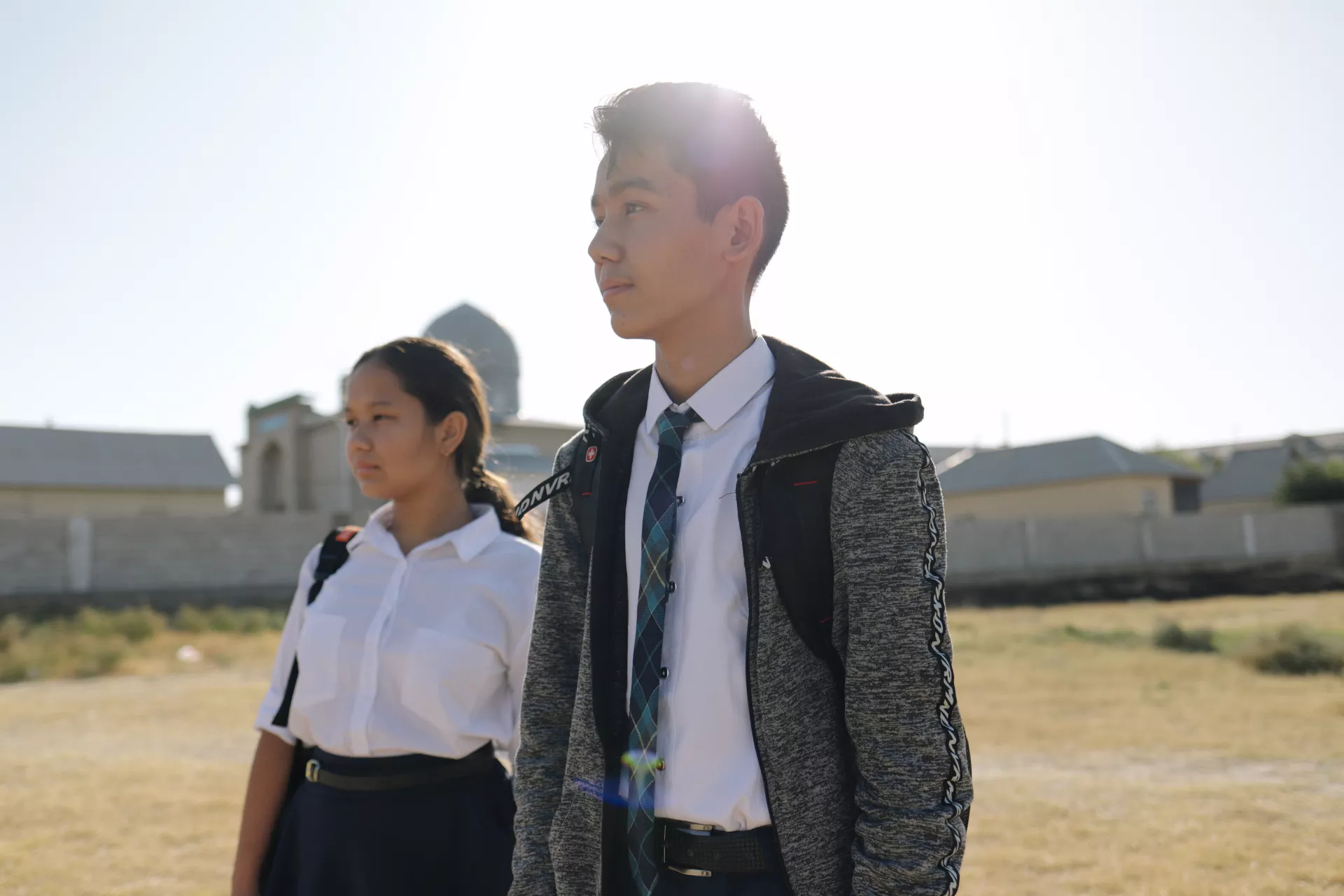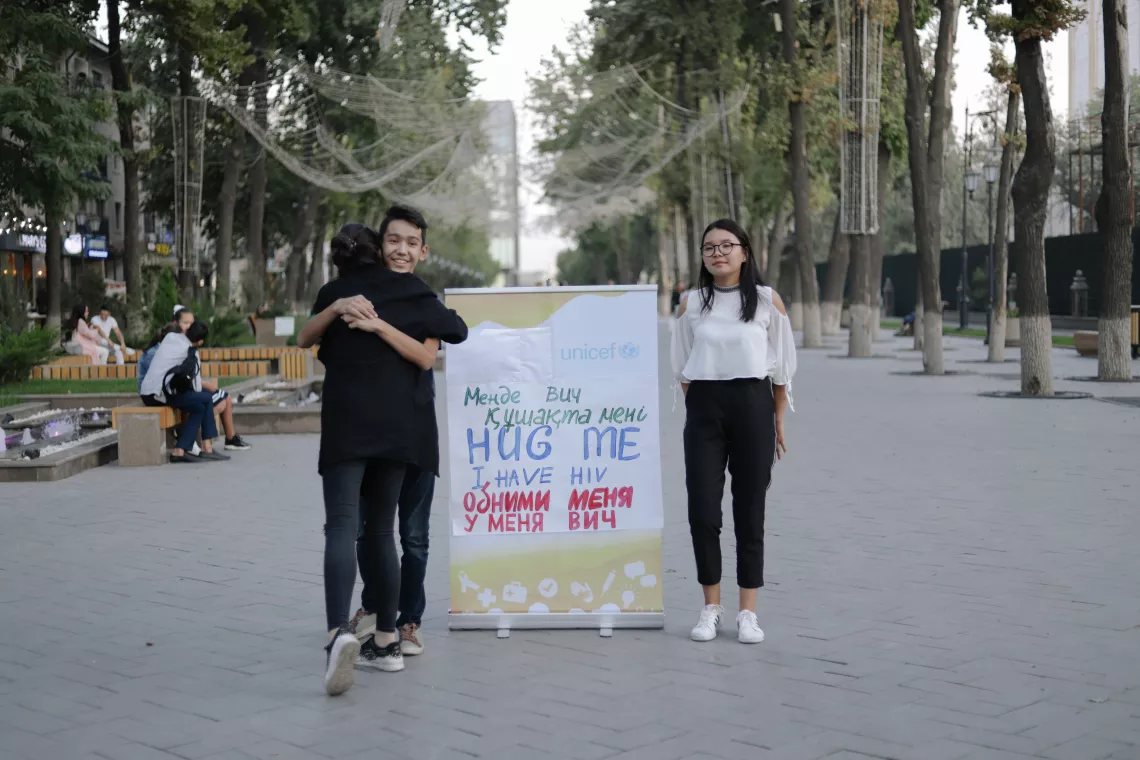For every child, every right: Baurzhan, advocate for young people living with HIV in Kazakhstan
Helping teenagers with HIV find their voice

- Available in:
- English
- русский
This story is part of special series produced by the UNICEF Europe and Central Asia Office on young advocates using their voices to protect and promote the rights of other young people to mark 30 years of the Convention on the Rights of the Child.
“I am one of those 149 children. I am HIV-positive and today, I am the only teenager in Kazakhstan with HIV who is living openly.”
Fourteen-year-old Baurzhan and his friends stand in the bustling heart of Shymkent city, Kazakhstan, next to a large sign that says “Hug me, I have HIV.” And sure enough, people line up to embrace him.
It’s not the first time that Baurzhan has gone public about his HIV status. The hugging idea emerged from a TEDx talk last year, when he and his mother Aliya described their experiences since Baurzhan’s diagnosis when he was just nine months old. Before an audience of 100 people, Aliya asked if anyone could remember an incident in 2006 when 149 children in southern Kazakhstan were accidentally infected with HIV through blood transfusions at a local hospital.
A few hands were raised and she went on to describe how these children and their families were still living in fear and isolation – all except one. Then Baurzhan chimed in: “I am one of those 149 children. I am HIV-positive and today, I am the only teenager in Kazakhstan with HIV who is living openly.”
The audience gave him a standing ovation. And afterwards, many people asked if they could give him a hug.

“Hug me, I have HIV.”
For Baurzhan, this has been a long journey. When he was small, his parents had always reassured him that he was just like everyone else, that his HIV infection was easy to manage with medication and that there was nothing to fear.
“My parents wanted me to feel comfortable with my status in the future,” he says. “So they started telling me about HIV from the age of five. By the age of 10, I could already relate to my status and HIV was not a problem for me in my life.”
Sadly, not everyone felt the same, as he found out when he went to school.
“When I entered primary school, the teachers recommended that I avoid recess. A classmate came up to me and said, ‘Baurzhan, you have HIV, don’t come near me’. I was not ready to hear it. It hurt a lot.”
His parents – always his strongest champions – rallied to his defense. Instead of hiding away, they helped the school organize training on the rights of all children, including those with HIV, to live without the fear of stigma and discrimination. After the very first session, the boy who had insulted Baurzhan apologised for what he had said.


For the next three years, his parents ran regular trainings for school personnel. Every school year would start with an introduction to child rights, stigma and discrimination.
But as Baurzhan grew, he and his peers felt the needed to do more – to take concrete action. Baurzhan formed a support group initially called ‘Super Hedgehogs’ but later renamed ‘Asian teens’.
“We choose topics for discussion, as we hold our own personal training sessions at the park,” he explains. The self-help group aims to help others with HIV, especially those who live in fear that they will not be accepted. It also includes siblings, other relatives and friends of children with HIV.
For Baurzhan, this is all about challenging persistent stereotypes around HIV. “People still think that HIV is the plague of the century,” he says. “But I think it is high time for society to change its attitude. HIV does not prevent us from participating in sports, learning and having a hobby. HIV is not an obstacle to do what we want. I know teens who live with HIV: they go to school, go to courses, combat sports and everything is fine with them. I know that I am no different from other children, teenagers or adults, because we are the same as them.
“I would like other people to know that people living with HIV infection are no different and there is no need to be afraid of them. "

“I would like other people to know that people living with HIV infection are no different and there is no need to be afraid of them. HIV does not interfere with normal life and people with HIV-positive status are not dangerous to society.”
At the same time, he is gracious about those who are wary. “How others relate to HIV is everyone’s own business: some take it calmly, some disapprove, and it will not be right to condemn those people who are afraid of HIV infection. We need to create new stereotypes. After all, we must fight HIV, not the people who have HIV infection.
“People are afraid of how their community will react to the news at school, at work. They are afraid that if people hear that they have HIV they will misunderstand them, will depart from them, that they will be offended, that children will be excluded from school. And in order not to face these problems, people hide their status.
“And for us, the main goal is to help the guys who still, after a long time, are depressed, those who still go out with fear. This is important for me, because I want to help people. I want them to be able to finally accept their status. I want to make the world a better place.”
HIV infection in Kazakhstan
The HIV/AIDS situation has changed in Kazakhstan since 2006, the year in which 149 children, including Baurzhan, were infected at a hospital. By 2010, UNICEF had helped to decrease the rate of HIV transmission from mother to child in south Kazakhstan, which at the time had the highest number of deliveries by HIV-positive women in the country.
At national level, joint efforts by the Ministry of Health and UNICEF reduced the rate of mother-to-child transmission from 10.9 per cent per 10,000 live births in 2007 to 1.8 per cent in 2014. Kazakhstan is now submitting a request to be certified as a country that has virtually eliminated mother-to-child HIV transmission.
However, more work remains to be done, says UNICEF Health and Nutrition Officer Kanat Sukhanberdiyev.
“Globally, we still see that many children are dying from HIV/AIDS. We have a long way to go until children and adolescents with HIV receive the full package of healthcare and psychosocial support.”
UNICEF is calling on the world to increase investments in HIV prevention, testing and treatment programmes. Without such investments, the lives of some 360,000 adolescents will continue to be at risk of AIDS-related diseases by 2030.
For more about UNICEF’s work on HIV in Kazakhstan, click here.
The CRC @ 30 in Kazakhstan
2019 is the 30th anniversary of the Convention on the Rights of the Child (CRC): the most widely ratified human rights treaty in history. The CRC has helped to transform children’s lives worldwide, inspiring Governments to change laws and policies and invest in children’s health, education and protection. Importantly, it has enabled more children like Baurzhan to have a voice, participate in their societies and hold their Governments to account.
To mark this anniversary, UNICEF is calling on all countries to reaffirm and intensify their commitment to child rights by adopting the ‘global pledge’ to children.
On the eve of World Children’s Day on 20 November, UNICEF Kazakhstan will join school students to present the situation analysis of children in Kazakhstan, aiming to spark greater dialogue on the progress achieved since Kazakhstan ratified the Convention on the Rights of the Child in 1994. Children will raise their most urgent issues and call on adults to take action.




